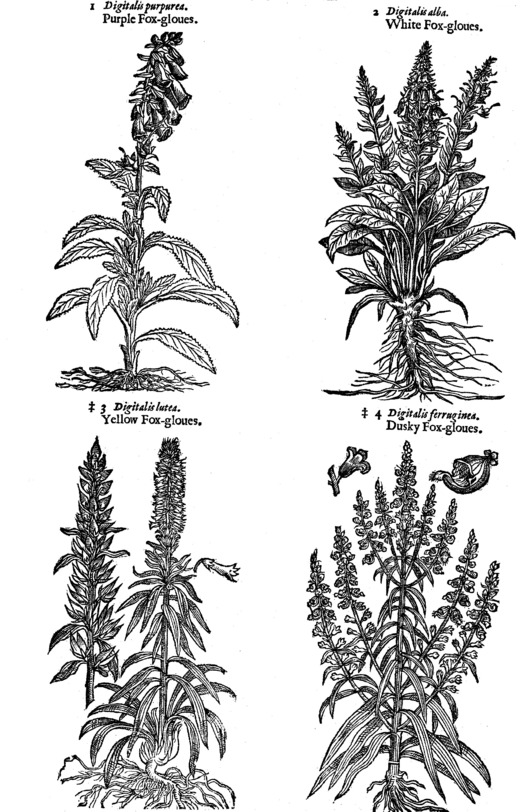
Gerard's Herbal - Part 3

Fig. 1174. Kinds of Foxgloves (1-4)
The Description
1. Foxglove with the purple flower is most common; the leaves whereof are long, nicked in the edges, of a light green, in manner like those of Mullein, but lesser, and not so downy: the stalk is straight, from the middle whereof to the top stand the flowers, set in a course one by another upon one side of the stalk, hanging downwards with the bottom upward, in form long, like almost to finger stalls, whereof it took his name Digitalis, of a red purple colour, with certain white spots dashed within the flower; after which come up round heads, in which lies the seed, somewhat brown, and as small as that of Thyme. The roots are many slender strings.
2. The Foxglove with white flowers differs not from the precedent but in the colour of the flowers; for as the others were purple, these contrariwise are of a milk-white colour.
3. We have in our gardens another sort hereof, which bringeth forth most pleasant yellow flowers, and somewhat less than the common kind, wherein they differ. This also differs from the common kind in that the leaves are much smoother, narrower, and greener, having the nerves or veins running alongst it, neither are the nerves snipped, nor sinuated on their edges.
4. We have also another sort, which we call Digitalis ferruginea, whose flowers are of the colour of rusty iron; whereof it took his name, and likewise maketh the difference. Of this sort there is a bigger and a lesser; the bigger hath the lower leaves four foot long, of a dark green colour, with veins running along them; the stalks are some yard and half high: the flowers large, and ending in a sharp turned up end as you see in the figure, and they are of a rusty colour, mixed of a yellow and red.
5. The lesser dusky Foxglove hath much less leaves and those narrow, smooth, and exceeding green: amongst which comes up a stalk some foot high, having small flowers of the colour of the last described. This I observed the last year 1632, in flower with Mr. John Tradescant in the middle of July. It may fitly be called Digitalis ferruginea minor, Small Dusky Foxglove.
The Place.
Foxglove groweth in barren sandy grounds, and under hedges almost everywhere.
Those with white flowers do grow naturally in Londsdale, and Craven, in a field called Crag-Close, in the North of England: likewise by Colchester in Essex; near Exeter in the West parts, and in some few other places. The other two are strangers in England, nevertheless they do grow with the others in my garden.
The Time.
They flower and flourish in June and July.
The Names.
Foxgloves some call in Greek Thryallis, and make it to be Verbasci species, or a kind of Mullein: in Latin, Digitalis: in High Dutch, Fingerhut, and Fingerkraut, in Low Dutch, Vinger Hoet: in French, Gantes Nostre Dame: in English, Foxgloves. Fabius Columna thinks it to be that Ephemerum of Dioscorides described in his fourth book, and cap. 75.
The Temperature.
The Foxgloves in that they are bitter, are hot and dry, with a certain kind of cleansing quality joined them; yet are they of no use, neither have they any place amongst medicines, according to the ancients.
The Virtues.
A. Foxglove boiled in water or wine, and drunken, doth cut and consume the thick toughness of gross and slimy phlegm and naughty humours; it openeth also the stopping of the liver, spleen, and milt, and of other inward parts.
B. The same taken in like manner, or boiled with honeyed water or sugar, doth scour and cleanse the breast, ripeneth and bringeth forth tough and clammy phlegm.
C. They serve for the same purposes whereunto Gentian doth tend, and hath been used in stead thereof, as Galen saith. So saith our author, but where or by what name Galen either mentions, or affirms this which our author cites him for, I must confess I am ignorant. But I probably conjecture that our author would have said Fuchsius: for I only find him to have these words set down by our authour, in the end of his Chapter of Digitalis.